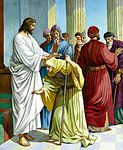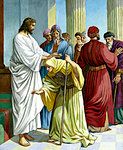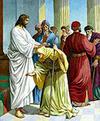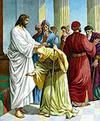Paul's Charge Concerning the Offender: Part 2 of 3 (series: Lessons on 2 Corinthians)
by John Lowe
(Woodruff, S.C.)

7 so that, on the contrary, you ought rather to forgive and comfort him, lest perhaps such a one be swallowed up with too much sorrow.
8 Therefore I urge you to reaffirm your love to him.
Evidently, the reproof that the Corinthians had meted out was sufficient—at least. Titus had reported that it was (see 7:8-10){4]. The unnamed offender had realized the seriousness of his actions. Paul was extremely concerned that the Corinthiansforgive{1] and console the offender at the appropriate time. He did not want the offender to be overwhelmed by excessive sorrow. Paul wasn’t concerned for his own vindication in this distressing incident but instead for the offender’s spiritual welfare. Unlike Paul, there are some people who take everything personally. Criticism, even when it is kindly meant and kindly given, they take as a personal insult. Someone very close to me is like that, and therefore, I am very careful about how I phrase any comments and suggestions that I have for her. It would be well to remember that criticism and advice are usually offered, not to hurt us, but to help us. But let’s be honest, does anyone really enjoy being criticized—I don’t think so!
Just as on his last visit, Paul had passionately urged the Corinthians to punish the offender (13:2){12], here he encouraged the Corinthians to reaffirm {2] their love for the offender. The intent of church discipline should be reform, not punishment. The goal should be to bring the offender to repentance, and if he repents, the church—that is, the entire church—should forgive him and restore him to the fellowship. Satan can use any unforgiveness that remains to gain a foothold in the church.
God is the ultimate judge and the ultimate punisher of every person’s deeds (James 4:12){13}. On this earth, however, the church has the responsibility to discipline members who are straying from the truth of the Gospel or the righteous life that God demands. In this situation, the discipline had promoted genuine repentance. Thus the Corinthians were to restore the man who was being disciplined, showing him genuine Christian love. Paul was asking the Corinthian church to confirm the membership of this man in the community of love—that is, the church—in a public and official manner. Paul doesn’t quote Jesus on this matter, but he was, in effect, following Jesus’ own instructions: “Take heed to yourselves. If your brother sins against you, rebuke him; and if he repents, forgive him” (Lk. 17:3). Paul knew there was—and is—no place in the church for man-made limits on God’s grace, mercy, and forgiveness toward repentant sinners. Such restrictions could only rob the fellowship of the joy of unity (Matt. 18:34, 35{14]; Mk. 11:25, 26). The Christian duty is not to render the sinner harmless by battering him into submission, but to inspire him to goodness. Over-severity may well drive him from the church and its fellowship, while sympathetic correction might well bring him in.
Knowing the proper time to rebuke and the appropriate time to forgive is the key to compassionate church discipline. In his letter to the Corinthians, Paul was teaching the Corinthian church to discern the proper occasion for both (see 13:1-5; 1 Cor. 5:1-5). This kind of discernment is crucial for a church plagued with problems, as the Corinthian church was. Christians in positions of authority must consistently check their motives when it comes to church discipline. They must ask: Am I keeping the spiritual welfare of my church members—especially that of the offender—in mind?
True discipline is an evidence of love (see Heb. 12). Some young parents with “modern views” of how to raise children refuse to discipline their disobedient offspring because these parents claim they love their children too much. But if they really loved their children they would chasten them. Every parent that disciplines a child must follow that discipline with assurance of forgiveness and love, or the discipline will do more harm than good.
9 For to this end I also wrote, that I might put you to the test, whether you are obedient in all things.
Paul reiterated his reason for writing the “severe letter” to the Corinthians. First of all, he hoped the letter would rectify the troublesome situation before he arrived (see 2:3){3]. When he visited them, he wanted to encourage them in their faith instead of correcting them. Second, he wanted to test their obedience; by “in all things,” he wanted to show that incomplete obedience is intolerable. Third, he wanted to tell them of his love for them.
After taking pains to emphasize how he was working with the Corinthians for their joy instead of tyrannically controlling their faith (1:24){15], Paul praised their obedience to the Gospel. As Paul explained to the Romans, God had assigned him to the apostolic task of calling people to obedience to God, which comes out of faith in Christ (see Rom. 1:5){16]. Later in 2 Corinthians, Paul would unequivocally assert his authority as an apostle to punish disobedience. He had been empowered by Christ with apostolic authority (10:4-6){17]. But Paul’s authority didn’t involve commanding obedience to himself but, instead, to Christ and the Gospel. Paul explained this thoroughly to the Galatians. His message was the Gospel revealed to him by Jesus Christ Himself. A preacher of any other gospel than the one he preached would be eternally condemned (Gal. 1:6-12). In 1 Corinthians Paul maintained that he had preached only the message of Christ crucified. He had added nothing to it.
Although both Jew and Gentile consider it foolish, the message possessed the power of God. Paul did possess the authority to demand obedience to the message and to the God of the Gospel. He announced his authority to the Thessalonians (1 Thess. 4:2){18]. When Paul defended his apostolic authority to the Corinthians, he was careful to explain that he possessed the authority to build up the church, not to tear it down (see 10:8{19]; 13:10).
The good news was that the Corinthians were obedient to the gospel. Titus’ report from Corinth revealed that they had listened to Paul’s rebuke and had obeyed his instructions. Their complete obedience in these matters caused Paul to rejoice (7:13-16).
10 Now whom you forgive anything, I also forgive. For if indeed I have forgiven anything, I have forgiven that one for your sakes in the presence of Christ,
For Paul, forgiveness was the central part of the Gospel. Out of His own free will, God forgives those who believe in His Son (Rom. 3:24{20]; 5:15). It is only through God’s grace—that is, His undeserved favor—that anyone is saved at all (Eph. 2:5, 8){21]. So the Corinthians’ forgiveness of the offender among them was fundamentally based on Christ’s forgiveness of them (Eph. 4:32; Col. 3:13{22]).
This verse downplays Paul’s own part in the entire incident. Paul did not want to imply that he was governing the Corinthians’ faith (see Paul’s denial of any motives like that in 1:24{15]). Hence, he phrased the pronouncement of forgiveness in the opposite way as would be expected. Since the offense was primarily directed against Paul (see v. 5), he could have been the first to pronounce forgiveness. Instead, he emphasized that it was the Corinthians who should forgive. The actual decision to restore the offender Paul leaves to the church, but he earnestly pleads that they would do so. He would merely agree with their verdict. In this self-deprecating manner, Paul even suggested that he didn’t have anything to forgive. In this way, he was reiterating the point that the offense had been against the entire church, not merely himself.
But there is yet another party that has been hurt by this man, whoever he might be. The problem was not simply between a sinning brother and a grieving apostle: it was also between a sinning brother and a grieving Savior. The man had sinned against Paul and the church, but he had most of all sinned against the Lord. When timid church leaders try to “whitewash” situations instead of facing them honestly, they are grieving the heart of the Lord.
The Greek phrase for “in the presence of Christ” is literally “in the face of Christ.” Paul was making the point that all of the deliberations of the church were in Christ’s presence. Paul knew that his entire life was lived in the sight of God, who knew everything he thought, and did, and said (see v. 17{23]; 4:2; 2 Tim 4:1). In downplaying his own authority in this situation, Paul was pointing to the ultimate authority: Christ Himself. It was before Christ that the church would forgive the offender, and it was before Christ that Paul—hundreds of miles away—would forgive the same offender.
The emphasis in this letter on church discipline is an indication of its importance. Yet it is a subject that is all but neglected in many evangelical churches today. It is another instance where we can profess to believe in the inspiration of the Scriptures, yet refuse to obey them when it suits our purposes.
11 lest Satan should take advantage of us; for we are not ignorant of his devices.
Paul spoke of Satan more in his letters to the Corinthians than in any other of his New Testament letters. He saw the telltale signs of a demonic attack on the church at Corinth. Second Corinthians unambiguously identifies the “false apostles” in the Corinthian church with the clever deceptions of Satan (see 11:4){24]. Moreover, Paul identifies Satan as the one who was tempting some in the church into sexual immorality (see 1 Cor 5:1-5; 6:12-20) and others to participate in the idolatrous feasts of their pagan neighbors (see 1 Cor. 10:18-22). As Christians we have certain things in common:
1. A common foe—“Satan.”
2. A common danger—“Satan could take advantage of us.”
3. A common protection—“we are not ignorant of his devices.”
No content on preachology.com may be printed or
copied to any other site without permission.
|
The Preaching Ezine Subscribe to my free newsletter for monthly sermons and get a free book right now. Just follow the link above and get the details! |
|
Sermon Supply Ministry
Be ready for Sunday…before Saturday night! |
|
Manna Seminary
Did you ever want to start or finish your Ministry Training? |
|
YOUR PAGES: by sharing YOUR great sermons! by sharing YOUR great poems! |










